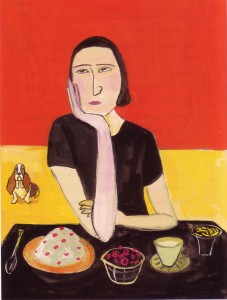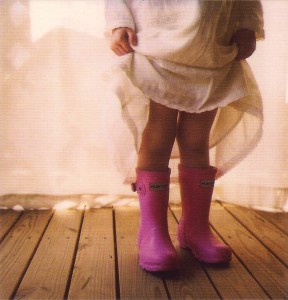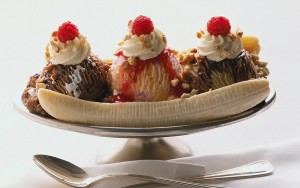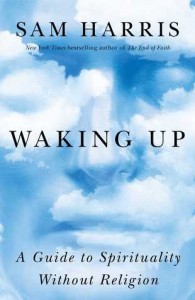Don’t Be Fooled
 “Within itself, the mind is already peaceful. That the mind is not peaceful these days is because it follows moods. It becomes agitated because moods deceive it. The untrained mind is stupid. Sense impressions come and trick it into unhappiness, suffering, gladness and sorrow, but the mind’s true nature is none of these things.
“Within itself, the mind is already peaceful. That the mind is not peaceful these days is because it follows moods. It becomes agitated because moods deceive it. The untrained mind is stupid. Sense impressions come and trick it into unhappiness, suffering, gladness and sorrow, but the mind’s true nature is none of these things.
“Gladness and sadness is not the mind, but only a mood coming to deceive us. The untrained mind gets lost and follows these things. It forgets itself, then we think that it is we who are upset or at ease or whatever. But really this mind of ours is already unmoving and peaceful, really peaceful.
“So we must train the mind to know these sense impressions and not get lost in them. Just this is the aim of all this difficult practice we put ourselves through.”
— Ajahn Chaa, A Taste of Freedom, Buddhist Publication Society Wheel Publications
***
(illustration by Maira Kalman: Food is a Costly Antidepressant — from Food Rules: An Eater’s Manual)
What Do I Really Need?
 Today’s post from the Kindness Handbook, by Sharon Salzberg:
Today’s post from the Kindness Handbook, by Sharon Salzberg:
“What do I really need right now, in this moment, to be happy? The world offers us many answers to that question: You need a new car and a new house and a new relationship and… But do we really?
“What do I lack right now? Does anything need to change in order for me to be happy? What do I really need?
“….As I go through all kinds of feelings and experiences in my journey through life–delight, surprise, chagrin, dismay–I hold this question as a guiding light: ‘What do I really need right now to be happy?’
“What I come to over and over again is that only qualities as vast and deep as love, connection, and kindness will really make me happy in any sort of enduring way.”
***
(photo by Jenifer Altman, from For the Love of Light, published by Chronicle Books
Going Nowhere
 Another of my Dharma buddies (thanks, Thomas!) pointed me to a beautiful little book by celebrated travel writer, Pico Iyer, with the wonderfully provocative title — The Art of Stillness: Adventures in Going Nowhere. Which was inspired by Iyer’s visit with the famous singer/songwriter Leonard Cohen during his 5 years of living as a Zen monk.
Another of my Dharma buddies (thanks, Thomas!) pointed me to a beautiful little book by celebrated travel writer, Pico Iyer, with the wonderfully provocative title — The Art of Stillness: Adventures in Going Nowhere. Which was inspired by Iyer’s visit with the famous singer/songwriter Leonard Cohen during his 5 years of living as a Zen monk.
Here’s a passage from the book:
Going nowhere, as Leonard Cohen would later emphasize for me, isn’t about turning your back on the world; it’s about stepping away now and then so that you can see the world more clearly and love it more deeply…
So much of our lives takes place in our heads–in memory or imagination, in speculation or interpretation–that sometimes I feel that I can best change my life by changing the way I look at it. As America’s wisest psychologist, William James, reminded us, “The greatest weapon against stress is our ability to choose one thought over another.”
It’s the perspective we choose–not the places we visit–that ultimately tells us where we stand. Every time I take a trip, the experience acquires meaning and grows deeper only after I get back home and, sitting still, begin to convert the sights I’ve seen into lasting insights.
***
(The photo above is one of many included in the book, all taken in Iceland by Eydis Einarsdottir. Click here to see more.)
Not Moving and Not Still
 One of my Dharma buddies (hi, Lori!) wrote to say that the book I posted about on Friday — Listening to the Heart — is a Christmas present she will give to herself and that next March, she will sit a retreat at IMS with the authors — Kittisaro and Thanissara. (Another great gift, I might add.) She asked that I post something more from the book, so here’s a passage, written by Kittisaro, which has already had a big impact on my practice:
One of my Dharma buddies (hi, Lori!) wrote to say that the book I posted about on Friday — Listening to the Heart — is a Christmas present she will give to herself and that next March, she will sit a retreat at IMS with the authors — Kittisaro and Thanissara. (Another great gift, I might add.) She asked that I post something more from the book, so here’s a passage, written by Kittisaro, which has already had a big impact on my practice:
During my sabbatical year on retreat I had the precious opportunity to continually empty the heart of subtle splits. Many times a day I would reflect on a phrase from the Heart Sutra: “All dharmas are empty of characteristics.”
I noticed that habitually my thoughts would label, define, and concretize whatever was happening, making that activity seem real. While walking, I ordinarily gave reality to the “characteristic” of movement.
Emptying the heart of that perception, letting that thought dissolve, I noticed the essential stillness within walking. I practiced walking while perceiving the unmoving suchness that is always here and now.
While sitting and feeling peaceful, when the heart attached to the perception of stillness, I noticed the movement within stillness–the breath flowing, the sensations vibrating, the sounds flickering. I reflected on stillness during movement and the movement within stillness, emptying the rigid distinctions I make unconsciously, all the time. Movement and stillness, each is just a way of talking.
Letting thoughts subside, the true Dharma is not moving and not still.
Similarly, there is a tendency to create a difference between good states and bad states, mindful moments and heedless moments, enlightened and deluded, in here and out there, feeling peaceful and suffering, meditating and not meditation, being on retreat and being back in the world.
Every time I noticed the heart making a mark, creating a split, I practiced letting that thought go, revealing its essential emptiness. This beautiful and peaceful practice is sometimes called cultivating patience with the non-production of dharmas.
It Just Needs to Ripen
 “Wisdom is in you, just like the sweet ripe mango is already in a young green one.” — Ajahn Chah
“Wisdom is in you, just like the sweet ripe mango is already in a young green one.” — Ajahn Chah
The quote for today is from a wonderful new book I’ve been reading by Kittisaro and Thanissara, who I’m going to be sitting with in South Africa for the month of January. The book is called Listening to the Heart: A Contemplative Journey to Engaged Buddhism.
I’m only on chapter 4, but already I want to recommend it to everyone! Here’s what Phillip Moffitt has to say: “Listening to the Heart is three books in one. It’s a guide to deep understanding of Buddhist dharma, an explanation of psychological growth, and a love story.” (Twenty years ago Kittisaro and Thanissara were monastics, but now they are husband and wife!)
Another Escape
 The Monday night KM Book Group meets tonight and the passage I underlined for discussion is this quote from the Buddha:
The Monday night KM Book Group meets tonight and the passage I underlined for discussion is this quote from the Buddha:
“Being contacted by painful feeling one seeks delight in sensual pleasure. For what reason? Because the uninstructed worldling [meaning: regular a person who hasn’t learned the Buddha’s teachings] does not know of any escape from painful feeling other than sensual pleasure…”
Right. But, of course, it doesn’t work.
It feels good for a moment. But it’s not really satisfying because the pleasure doesn’t last. And it does nothing to address the underlying problem. What’s worse, it just adds it’s own painful consequences.
So what other “escape” is there? Painful feelings (both physical and psychological) are always popping up!
Here’s what the Buddha says: “When feeling a pleasant feeling, one knows, ‘I feel a pleasant feeling.’ When feeling an unpleasant feeling, one knows, ‘I feel an unpleasant feeling.’…”
What that means in practice is to stay with the feeling…recognizing that it’s unpleasant, but not getting carried away with it. For example: I feel really lonely.
The practice is to notice the feeling before it goes all the way into: I’m so alone. Everywhere I look, I see people together. I’ve got nobody. Nobody loves me. I’ll never have sex again. I’m too old. I’m too fat. I’m so depressed. I feel like shit…..
Instead of that, notice the “I feel lonely” voice right when it starts up. Then notice: This feels unpleasant. Then pay attention to whatever comes up next. Probably something like: I don’t like this. Notice how that feels. Is it pleasant or unpleasant? Probably unpleasant. Then just keep noticing what comes up and whether it’s pleasant or unpleasant (or neither).
Pretty soon you’ll notice that when you don’t keep adding fuel to the fire, the feeling dies down. It comes and goes. It’s not permanent. You’re not doomed. You may even have enough peace of mind at that point to see that something can be done to address the situation. Or not. And even that, you can come to be at peace with.
We Are Not Our Hair
 Our Dharma Book Group meets tonight and we are starting to discuss Chapter 10 of Joseph Goldstein’s new book, Mindfulness: A Practical Guide to Awakening. This is the chapter that includes some of the less-common meditations on the body, including the practice of contemplating its anatomical parts.
Our Dharma Book Group meets tonight and we are starting to discuss Chapter 10 of Joseph Goldstein’s new book, Mindfulness: A Practical Guide to Awakening. This is the chapter that includes some of the less-common meditations on the body, including the practice of contemplating its anatomical parts.
“In this body there are head-hairs, body-hairs, nails, teeth, skin, flesh, sinews, bones, bone-marrow, kidneys, heart, liver, diaphragm, spleen, lungs, bowels, mesentery, contents of the stomach, feces, bile, phlegm, pus, blood, sweat, fat, tears, grease, spittle, snot, oil of the joints, and urine.”
Yuck. Right?
But really, it’s just the truth. This body, which I think of so strongly as ME, is really NOT me.
Which is good news.
I am NOT my hair, or bones, bowels, blood, or any of the other “stuff” that make up this body. Which, of course, I know. I am clearly more than my body. I know that.
But I still kind of think of this body as MINE.
That’s not really true either, because I can’t control “my” body — I can’t tell it to grow or not grow, to age or not age, to be sick or not be sick. I can have some effect on the way it grows or ages, etc, but really, not that much. It does what it does in accordance with the laws of nature. Clearly not in accordance with my desires or wishes.
Which is not exactly good news.
But it’s the truth. This is the way things are.
And it’s always better to be dealing with what IS, than to be thinking — and acting — as if thing were other than they actually are.
Buddhist Atheist
 I was very impressed by the recent interview with Sam Harris in the philosophy column of the New York Times, and as a result, I’m now reading his new book, Waking Up: A Guide to Spirituality Without Religion.
I was very impressed by the recent interview with Sam Harris in the philosophy column of the New York Times, and as a result, I’m now reading his new book, Waking Up: A Guide to Spirituality Without Religion.
I understand that Harris is an atheist. But he’s clearly a Buddhist atheist. (There are quite a lot of us.)
The way this book is organized should give you a hint:
Chapter 1: Spirituality
The Search for Happiness
Religion, East and West
Mindfulness
The Truth of Suffering
Enlightenment
Chapter 2: The Mystery of Consciousness
The Mind Divided
Structure and Function
Are Our Minds Already Split?
Conscious and Unconscious Processing in the Brain
Consciousness Is What Matters
Chapter 3: The Riddle of the Self
What Are We Calling “I”?
Consciousness With our Self
Lost in Thought
The Challenge of Studying the Self
Penetrating the Illusion
Chapter 4: Meditation
Gradual versus Sudden Realization
Dzogchen: Taking the Goal as the Path
Having No Head
The Paradox of Acceptance
Chapter 5: Gurus, Death, Drugs, and Other Puzzles
Mind on the Brink of Death
The Spiritual Uses of Pharmacology
Conclusion
***
I’m just halfway into Chapter 1, but so far I like it a lot.
Here’s a sample quote:
Our world is dangerously riven by religious doctrines that all educated people should condemn, and yet there is more to understanding the human condition than science and secular culture generally admit.
More to come.
What You Have
 “What you have is all you need.”
“What you have is all you need.”
***
(Photo by Aya Brackett, from a lovely article in the October issue of Mindful magazine, written by Pico Iyer, with reference to his up-coming e-book, “The Art of Stillness: Adventures in Going Nowhere.” )
Coming Home
 I leave Chapel Hill tomorrow morning for a 2-day drive back to St. Louis. If all goes well, I’ll be home late Wednesday night, but I probably won’t be ready to post right away. So check back again sometime after Friday, Sept 5.
I leave Chapel Hill tomorrow morning for a 2-day drive back to St. Louis. If all goes well, I’ll be home late Wednesday night, but I probably won’t be ready to post right away. So check back again sometime after Friday, Sept 5.
In the mean time, I leave you with this list of “sayings, wise saws, and small stones from the Valley,” found in one of the new-to-me books I discovered at the Chapel Hill library: Aways Coming Home, by Ursula LeGuin. (published in 1985)
* Judgement is poverty.
* When I’m afraid, I listen to the silence of the field mouse. When I’m fearless, I listen to the silence of the mousing cat.
* If you don’t teach machines and horses to do what you want in their way, they’ll teach you to do what they want in your way.
* To go again where you have gone: Increase. To go backwards: Danger. Better to come round.
* Owning is owning, having is hoarding.
* The great hunter: one arrow in his quiver, one thought in his head.
* “Like” and “different” are quickening words, brooding and hatching. “Better” and “worse” are eggsucking words, they leave only the shell.
* Cats may be green somewhere else, but the cats here don’t care.
* Nothing can make water better.
